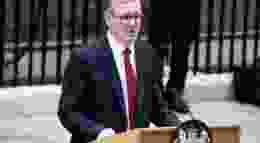
Britain needs America. Starmer must apologise to Trump
The phrase ‘election interference’ suggests shadowy backrooms and illicit secret dealings, perhaps involving organisations like the KGB or CIA. Labour party activists dishing out leaflets and chatting to voters on doorsteps is a very different image.
Joking aside, Labour’s involvement in the US election could cause a huge diplomatic upset. Whatever Keir Starmer or the rest of us might think of Donald Trump, he stands a good chance of becoming US president next month. If Starmer doesn’t take concrete steps to fix relations appropriately – starting with an official apology – the consequences of an unnecessary rift in UK-US relations could extend to the wider world.
It was late September when Starmer and Trump met for dinner in New York. Deepening the ‘special relationship’ was on the menu. Despite previous hiccups like foreign secretary David Lammy labelling Trump a “neo-Nazi sociopath” in a 2018 tweet, this dinner seemed to signal a new chapter. Starmer appeared to be putting national interest above party politics, acknowledging the possibility of Trump returning to power. It was a pragmatic move, even if it was driven by political necessity rather than any genuine goodwill.
Now, the good will created over dinner has all but evaporated. It has been revealed 100 Labour Party officials, including some from Downing Street, travelled to the US to aid Kamala Harris’ campaign in key battleground states. “We will sort your housing,” wrote Labour’s head of operations in a now-deleted LinkedIn post. Starmer and Labour officials have played down its significance, but this incident is nonetheless a diplomatic blunder with far-reaching consequences for the UK.
Many have been quick to point out figures like Liz Truss and Nigel Farage have openly campaigned for Trump in the past. If Trump is fine with them offering their endorsements, why shouldn’t Labour officials help Harris? But this argument misses a crucial difference: the Labour Party is in government. When top-level officials like Morgan McSweeney and Matthew Doyle are involved, the lines between personal activism and state endorsement blur. It’s one thing for opposition figures like Farage or Truss to pick sides in a foreign election; it’s quite another for members of a sitting government to get involved.
The issue isn’t just the involvement itself – it’s the message it sends. No one should be shocked a Labour government would prefer to see a Democrat like Harris in the White House. Ideologically, they’re aligned. Any government naturally wants to work with like-minded international partners. But there’s a difference between quietly hoping for an outcome and actively trying to influence it.
This kind of overt political involvement throws a wrench into the diplomatic works. Trump’s team has already filed an official complaint with US election authorities. It accuses Labour activists of ‘blatant foreign interference’ and does not pull its punches. If Trump wins, how does Starmer plan to navigate a relationship with a president who knows Labour worked against him and clearly feels strongly about it?

These concerns are not far-fetched hypotheticals. They are real and urgent. A Trump presidency could have serious implications for the UK, especially given his well-documented scepticism of international alliances like NATO. As war in Ukraine continues, the Middle East faces increasing instability, and China’s influence grows, the West needs a unified front more than ever. Trump has already indicated he could pull the US out of NATO and adopt a more isolationist stance, raising tariffs and turning inward. Labour’s actions may have only pushed him further down this path.
Starmer must take steps to fix the situation, or at least mitigate the damage. To begin with, Starmer must distance himself from the Labour officials who participated in this activism. So far, he has doubled down on defending them, insisting they were acting in a personal capacity in their “own time”. But when your senior aides are volunteering for a foreign election, it’s hard to maintain that fiction.
The prime minister should also withdraw any Labour Party funding that went into these trips, such as the apparent promise from the party HQ to “sort [their] housing.” If individuals want to volunteer for a US campaign, they can do so on their own dime, without the appearance of institutional backing. Finally, and perhaps most importantly, he should put any legalese aside and apologise, publicly and unreservedly, for any appearance of interfering in the US election.
The evidence is stacked against Labour. Ministers have said this was not organised by the party, but Sofia Patel’s LinkedIn post suggests a different story. Starmer’s misstep here is serious. It has created an unnecessary headache at a time when Britain ought to be preparing for all possible outcomes in the US election. Betting on Kamala Harris may pay off if she wins, but if Trump returns to power, Starmer will face a difficult and possibly hostile relationship with the most powerful country in the world.

Oliver Dean is a political commentator with Young Voices UK. He studies History and Politics at the London School of Economics and Political Science (LSE) where he is the Treasurer of the LSE Hayek Society.











